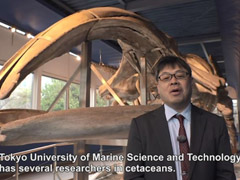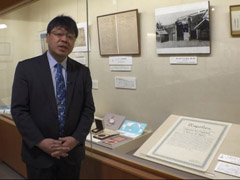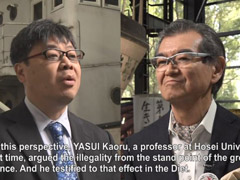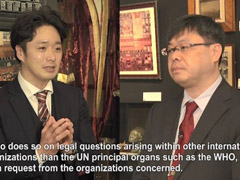- Home
- About JICA
- Organization
- Domestic Offices
- Tokyo Center
- Topics & Events
- 15 minutes to Understanding: Japan's Modern History of International law and the law of the sea
Topics & Events
May 31, 2021
15 minutes to Understanding: Japan's Modern History of International law and the law of the sea
To cope with the exclusive immigration policy under COVID-19 pandemic, JICA has been compelled to launch distance learning instead of inviting participants to Japan. Distance learning is basically composed of online lectures and self-learning with on-demand learning materials. In addition to these two components, in "Public International Law" course, a brand new program for the fiscal year 2020, we incorporated virtual excursions by making videos.
Do you know the number and name of ships which constituted Kurofune (the "black ships" of Commodore Matthew Perry) that forced an end to Japan's policy of isolation in 1854? You can learn such basic facts about Japanese International law and the law of the sea in the modern history, if you watch the videos.
The first attempt in the field
A Knowledge Co-Creation Program "Public International Law" had to be conducted entirely via the internet, which was a very difficult maiden voyage. The main text of the program was founded on UN Convention on the Law of the Sea (UNCLOS), and it covered 11 topics including followings:
- Maritime Spaces and International Law
- International Legal Governance of Crimes and Illegal Activities on the Sea
- Marine Resources and Cooperative Management
- Peaceful Settlement of International Disputes on the Sea
All the lecturers were very supportive and created original on-demand learning materials for the program.
The participants for the program were 9 young government officials from Cambodia, Indonesia, Kenya, Malaysia and Vietnam, they belonged to a variety of affiliations such as Ministry of Foreign Affairs, Ministry of Justice, Ministry of Fisheries and Coast guard agency.
Unlike face to face learning, distance learning does not allow participants to have a chat during the coffee break, or relaxed discussions over dinners. If they were able to visit Japan, even outside the classroom, they could have a deeper conversation about the difference of their systems or the interpretation of their national boundaries. But it is impossible in the Zoom meeting room.
On the other hand, distance learning makes other things possible. Participants are repeatedly able to watch the recorded videos of Q&A sessions, or tailor made on-demand learning materials. Also we can share those materials among the related programs, if the authors give us the agreement on copy rights.
Experiences during the distance learning gave us an opportunity to re-evaluate the role of the JICA's Training Program in Japan as a means of technical cooperation.
Virtual Excursions that enable participants to experience the reality of Japan
A Knowledge Co-Creation Program covers more than lectures and discussions in the seminar room. This is the difference from "study" at the academic institutions. JICA sets high values on the participants' experience in the real life of Japan that shows them how Japanese people materialize the theories which they learned in the seminar room. But it is impossible to bring them to the real life of Japan through distance learning.
Therefore, we created virtual excursions to make it possible. The program organizer visited museums and offices to interview resource persons for clarifying significances and histories of exhibitions that he has expected to show to the participants if they could visit Japan. We created following 4 videos;

In the first story, Mr. NAKADA Tatsuya, an associate professor* / the program organizer, introduced two museums that were located at the university where he belonged.
* His title at the time of the program

In the second story, the program organizer visited Diplomatic Archives of the Ministry of Foreign Affairs of Japan and Fisheries Agency to learn Japanese International law and the law of the sea in the modern history.

The third story explains the definition of maritime zones, and a related sad story which happened in 1950'.

The final video introduces the achievement of Mr. ODA Shigeru, a judge of International Court of Justice who emphasized the importance of maritime resources, and the latest maritime development.
<Information>
Course title: International Public Law focused on Law of the Sea and Peaceful settlement of International Dispute
Course duration: February 9, 2021 - March 19, 2021 (3 years program between FY2020 and FY2022)
Contact: Ukai.Hikoyuki@jica.go.jp
- About JICA
- News & Features
- Countries & Regions
- Our Work
- Thematic Issues
- Types of Assistance
- Partnerships with Other Development Partners
- Climate Change / Environmental and Social Considerations
- Evaluations
- Compliance and Anti-corruption
- Science and Technology Cooperation on Global Issues
- Research
- JICA Development Studies Program / JICA Chair
- Support for the Acceptance of Foreign HRs / Multicultural and Inclusive Community
- Publications
- Investor Relations
